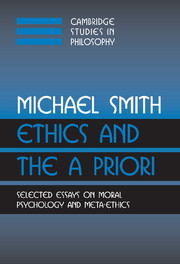Book contents
- Frontmatter
- Contents
- Preface
- Sources
- Introduction
- Part One Moral Psychology
- 1 Internal Reasons
- 2 The Incoherence Argument: Reply to Schafer-Landau
- 3 Philosophy and Commonsense: The Case of Weakness of Will (co-authored with Jeanette Kennett)
- 4 Frog and Toad Lose Control (co-authored with Jeanette Kennett)
- 5 A Theory of Freedom and Responsibility
- 6 Rational Capacities
- 7 On Humeans, Anti-Humeans, and Motivation: A Reply to Pettit
- 8 Humeanism, Psychologism, and the Normative Story
- 9 The Possibility of Philosophy of Action
- Part Two Meta-Ethics
- Index
- References
9 - The Possibility of Philosophy of Action
Published online by Cambridge University Press: 04 December 2009
- Frontmatter
- Contents
- Preface
- Sources
- Introduction
- Part One Moral Psychology
- 1 Internal Reasons
- 2 The Incoherence Argument: Reply to Schafer-Landau
- 3 Philosophy and Commonsense: The Case of Weakness of Will (co-authored with Jeanette Kennett)
- 4 Frog and Toad Lose Control (co-authored with Jeanette Kennett)
- 5 A Theory of Freedom and Responsibility
- 6 Rational Capacities
- 7 On Humeans, Anti-Humeans, and Motivation: A Reply to Pettit
- 8 Humeanism, Psychologism, and the Normative Story
- 9 The Possibility of Philosophy of Action
- Part Two Meta-Ethics
- Index
- References
Summary
Fred moves his finger, thereby flicking the switch, turning on the light, illuminating the room and alerting the prowler (Davidson 1963). What explains the action or actions he performs?
Commonsense tells us that we can give many different answers to this question. We might say that Fred moves his finger because he wants to flick the switch, that he flicks the switch because he thinks that doing so will enable the light to go on, that he turns on the light because doing so illuminates the room, that he illuminates the room because he has an obsessive aversion to darkness, that he alerts the prowler because he is ignorant of her presence, and so we might go on. Here, in one and the same situation, we see a rich panoply of commonsense explanans: some actions are explained by desires alone, others by beliefs alone, others by non-psychological facts about the world, others by psychological disorders, and still others by ignorance.
Whenever commonsense delivers up this sort of diversity philosophers get nervous. Since these explanations are all given in one and the same situation we clearly assume that they can co-exist. But is it so obvious that this assumption is correct? When we grant one sort of explanation, isn't it possible that we thereby, in effect, preclude others? And, if that isn't so, then why not? How and why is it that diverse explanations of the kind mentioned fit so neatly together?
- Type
- Chapter
- Information
- Ethics and the A PrioriSelected Essays on Moral Psychology and Meta-Ethics, pp. 155 - 178Publisher: Cambridge University PressPrint publication year: 2004
References
- 2
- Cited by



